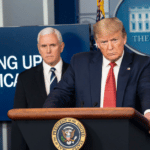




Vice President Kamala Harris has recently come under scrutiny for her prolonged absence from media interviews and press conferences.
Fox News reported that Harris has not participated in a formal press conference or sit-down interview for 24 days, drawing criticism from various quarters. This issue has sparked a debate among political commentators and figures, with some defending her decision while others express concern.
The controversy centers on Harris's lack of media engagement, with some Democrats desperately arguing that the criticism is overblown and doesn't reflect voters' priorities.
Republican commentator Lance Trover has been one of the more vocal critics, arguing that voters are eager to hear from Harris due to accusations of inconsistency on several progressive policy positions.
Trover's concerns reflect a broader expectation that candidates, particularly those in high-profile positions like the Vice President, should be accessible to the media and, by extension, the public.
During a CNN panel discussion, former Clinton aide Paul Begala came to Harris's defense. He dismissed the significance of her media avoidance, arguing that it would not matter to the average voter. "Just one question: Who cares?" Begala remarked, emphasizing that voters are more concerned with policy issues rather than the number of interviews a candidate conducts.
Begala further elaborated that issues like raising the minimum wage and reducing prescription drug costs are what resonate with voters, not the frequency of Harris's media appearances. He acknowledged that while it might be ideal for Harris to engage more with the press, he suggested the criticism should be kept in perspective.
CNN anchor Jim Acosta, who was part of the discussion, disagreed with Begala. Acosta emphasized the importance of media engagement, thanking Begala for "standing up for the free press." He asserted that Harris should indeed be participating in interviews and press conferences, framing it as a necessary part of a transparent political process.
Ana Navarro, a political commentator, also defended Harris during the CNN discussion.
She attributed Harris's lack of media presence to the busy schedule following her candidacy announcement about three weeks ago. Navarro expressed confidence that Harris would eventually engage with the media, but argued that the current criticism is premature.
Similarly, New Jersey Governor Phil Murphy supported Harris's approach, suggesting that there would be ample time for interviews before the November elections.
Murphy praised Harris for bringing "joy back into the whole arena of politics," indicating that her current focus might be on campaign strategies rather than media engagements. What joy Americans struggling with a sluggish economy are experiencing is unknown.
While the Harris campaign did not respond to a request for comment from Fox News Digital, these defenses from prominent Democrats suggest a coordinated effort to downplay the significance of Harris's media avoidance.
The debate over Harris's media engagement highlights a broader conversation about the role of the press in the political process.
On one side, critics argue that regular media interactions are essential for transparency and accountability. They believe that Harris's avoidance could signal a reluctance to face tough questions or a lack of confidence in defending her positions.
On the other side, defenders like Begala and Navarro contend that media engagement, while important, is not a top priority for most voters. They argue that what truly matters are the policies and actions that affect people's lives, not the number of interviews a candidate gives.
This debate is likely to continue as the election approaches and the pressure on Harris to engage with the media intensifies. Whether her current strategy will prove effective remains to be seen, but it is clear that opinions are divided on the matter.
In summary, Vice President Kamala Harris's avoidance of the media has sparked controversy, with critics and supporters offering differing perspectives on its significance.
While some argue that her lack of press engagement is a concerning trend, others, including prominent Democrats, believe that this issue is being overblown and does not reflect the priorities of the average voter.
As the election season progresses, it will be interesting to see if Harris adjusts her media strategy in response to the criticism or continues to focus on her campaign without significant media interaction. For now, the debate continues, with both sides firmly holding their ground.



